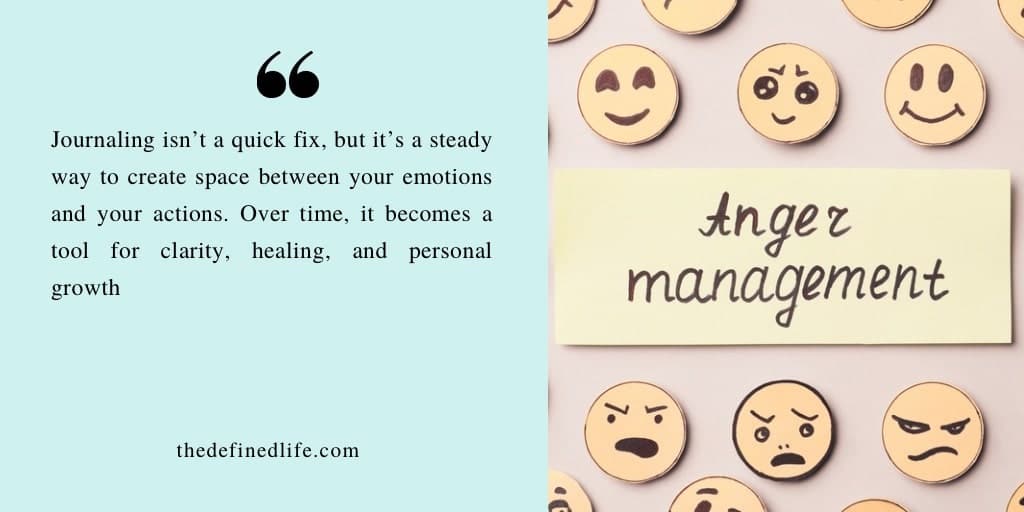
I’ll admit I’ve been feeling overwhelming anger lately. That led me to share how I manage my anger using my favorite hobby—journaling. Through these journaling prompts for anger, I’ve learned more about myself and started to recognize that my feelings are valid and deserve acknowledgment.
In this post, I’ll share prompts that help me manage anger in a healthy way. You’ll also discover how your journal can become a powerful tool for emotional health and personal growth, especially when things feel overwhelming.
Table of Contents
Why Journaling Helps with Anger
Writing things down doesn’t erase your emotions—but it gives them a place to go. Anger held in too long can turn into resentment, or even show up in our physical health.
But when you write it out, you can start to notice patterns, spot your triggers, and find space between reaction and choice.
Journaling creates room for clarity. It helps you:
Understand where the anger is really coming from
Anger often shows up as a surface emotion. When you slow down and journal, you can start to uncover what’s underneath—is it hurt, fear, or feeling dismissed? That clarity changes everything.
Gain valuable insights about what you need
Behind every strong emotion is a need that’s not being met. Journaling helps you name those needs honestly—like feeling respected, heard, or safe—so you can respond instead of staying stuck in reaction.
Manage your reactions before they explode
You don’t have to let anger build until it bursts. Writing gives your emotions a place to go before they take over. It becomes a small but steady practice in slowing down, so you can choose your next step with more awareness.
Shift toward a more positive response
Once you’ve let it out on paper, you’re more likely to approach the situation with a clear head. That doesn’t mean ignoring what happened—it means responding with honesty and care, instead of just reacting from the heat of the moment.
This isn’t about being perfect or never getting upset. It’s about learning to respond—not just react.
💡 Related post: 10 Journaling Ideas for Mental Health
12 Journaling Prompts for Anger
Use these prompts when you’re feeling tense, agitated, or just not sure what’s bothering you. You don’t have to answer them all. Let one meet you where you are today.
1. What happened that made me feel angry? What part of that situation felt unfair or disrespectful?
Start by naming the situation clearly. Sometimes just writing it down helps you feel seen or acknowledged. Identifying what felt wrong is the first step to understanding your reaction.

2. What did I really need at that moment? Was it to feel heard, safe, understood, or something else?
Every intense emotion points to a need. This prompt will help you uncover what would’ve made that moment feel better—and what you might ask for next time.
3. Where in my body do I feel this anger? Can I describe the physical sensation without judgment?
Anger doesn’t just live in your thoughts—it shows up physically. Naming the tightness, heat, or pressure in your body can ground you and help release some of the tension.
4. What thoughts am I having over and over again? What do those thoughts reveal about my deeper feelings?
Repetitive thoughts often carry clues about unresolved feelings. Journaling them out gives you distance, so you can spot patterns and gently ask what’s really underneath.
5. Is this anger mine—or am I carrying it for someone else?
Sometimes we hold onto anger that doesn’t fully belong to us—maybe from family, past roles, or learned patterns. This is a chance to separate what’s yours from what’s not.

6. What past experience might this trigger be tied to?
Current situations can stir old wounds. By tracing the thread back, you might find you’re not just reacting to now, but to something deeper that’s been waiting to be seen.
7. What would I say if I could be completely honest and kind at the same time?
This prompt invites emotional maturity—not denying your anger, but expressing it with clarity and care. It’s where honesty meets peace.
8. What am I trying to protect myself from by feeling this anger?
Anger can act like a shield. It may be guarding fear, vulnerability, or grief. This prompt helps you look at what’s behind the emotion—not to fix it, but to understand it.
9. What small thing can I do right now to care for my mental and emotional health?
You don’t need to solve everything at once. Just one kind, steady action—a walk, a breath, a break from the noise—can remind your body and mind that you’re safe.
10. Have I felt this kind of anger before? What helped me move through it?
Looking back can remind you of your own resilience. You’ve navigated tough emotions before—this is a chance to remember what worked and bring that tool forward.
11. What boundary might I need to set—or reinforce—to avoid this kind of situation in the future?
Anger is often a sign that a boundary was crossed. This prompt helps you reclaim your power—not through control, but through clarity and action.
12. What part of this experience can I learn from? How can I move forward in a healthy way?
Instead of staying stuck in the heat of the moment, you can choose growth. Ask: What’s the takeaway? What will I carry forward that supports my emotional health?

How to Use These Journal Prompts For Anger Management
There’s no right way to journal through anger. But here’s what I’ve found helpful:
- Don’t filter your emotions. Be honest—even if it’s messy.
- If you can’t find words, start with a feeling or a sentence: “I’m mad because…”
- Use a timer. Set it for 5 or 10 minutes and just write.
- Return to a few prompts that feel grounding or bring insight.
Pair it with a simple ritual—a warm drink, soft music, or lighting a candle can signal to your brain: this is time to feel, not suppress.
Try Creative Journaling for Emotional Release
If traditional journaling feels too intense, using creative tools can help. Collaging, using muted colors, or layering words with textures can support emotional release in a more visual, embodied way.
I like using kits like Faded Garden or Rustic Garden Pages from my shop when I need a safe, expressive space to explore my emotional layers without having to explain them all.
Click the images to check them out 🙂
🎨 Want to learn more? Read this post: Art Journaling Ideas for Self-Discovery and Self-Expression
Final Thoughts on Using Journaling Prompts for Anger
Anger is not the enemy—it’s a signal. When we stop trying to bury it or push it down, we can begin to understand it. We can meet it with curiosity and care.
Journaling isn’t a quick fix, but it’s a steady way to create space between your emotions and your actions. Over time, it becomes a tool for clarity, healing, and personal growth.
So if you’re feeling tense or overwhelmed today, give yourself permission to write. One sentence. One breath. One truth at a time.
If you missed the free worksheets and junk journal kits, you can check the resources here.
You don’t have to solve everything right now. You just have to show up.










Leave a Reply